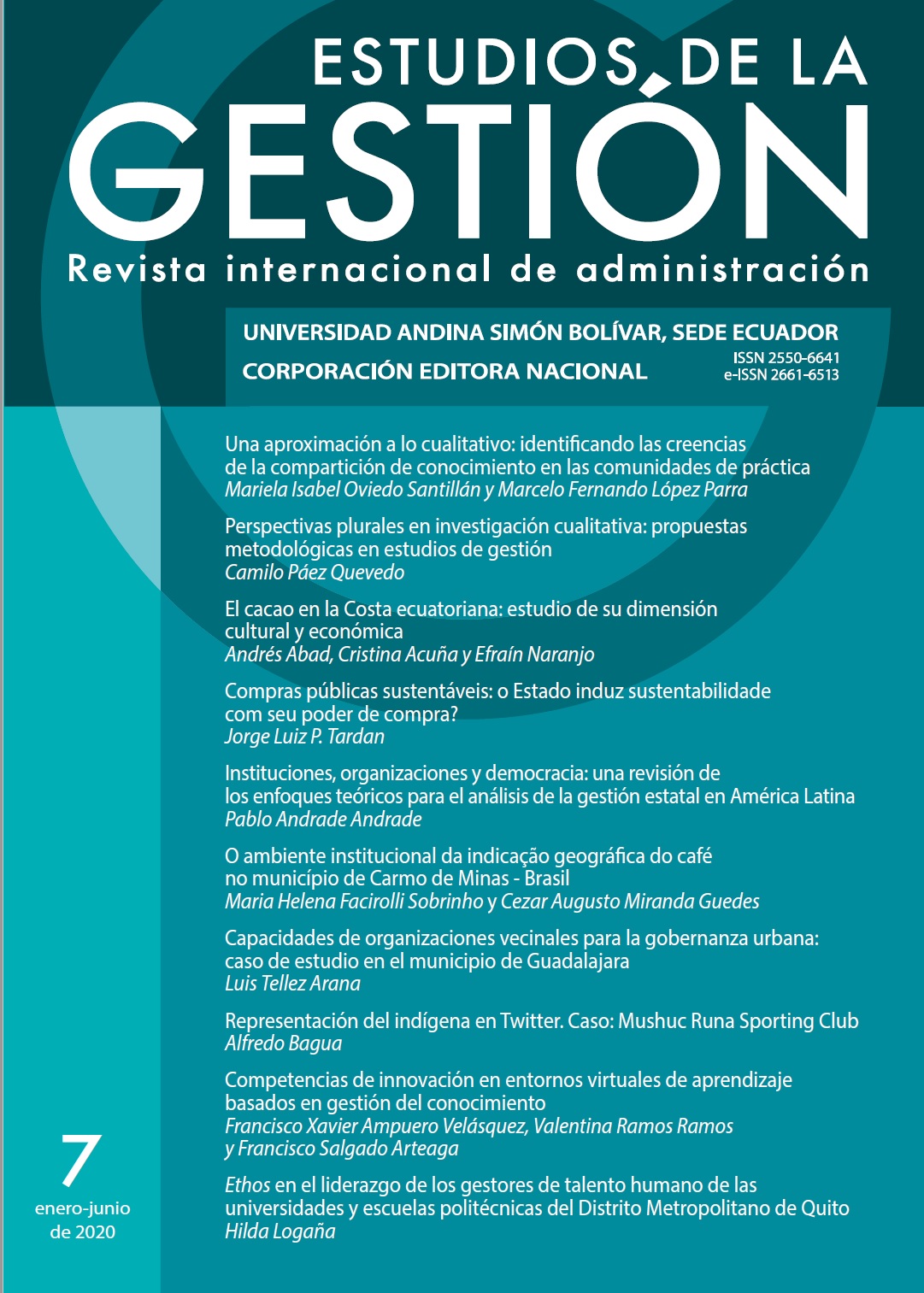Uma aproximação ao qualitativo: identificando crenças do compartilhamento de conhecimento nas comunidades de prática
DOI:
https://doi.org/10.32719/25506641.2020.7.1Palavras-chave:
Pesquisa qualitativa, métodos mistos, comunidades de prática, compartilhamento de conhecimento, motivação, administração públicaResumo
Este trabalho documental e exploratório enfatiza uma abordagem qualitativa como uma fase prévia e complementar do quantitativo. O estudo se compõe da aplicação de um caso prático e do uso da Teoria do Comportamento Planificado para identificar crenças condutuais, normativas e de controle que influem na motivação dos indivíduos para compartilharem seu conhecimento nas comunidades de prática das organizações públicas. Para tal, utilizou-se a entrevista para coletar dados, aplicada a especialistas da Administração Tributária na cidade de Quito-Equador. Os dados foram classificados e codificados em vocábulos, com vista ao reconhecimento de 63 crenças que, em um futuro e após uma priorização, permitirão a construção de um questionário que valide relações entre variáveis do modelo de motivação empregado. Na revisão documental, contrapõem-se pontos fortes do qualitativo e quantitativo, descarta-se sua incompatibilidade e se advoga pela seleção de aproximações híbridas, ressaltando o melhor de cada método e exemplificando a utilização dos métodos qualitativos na construção de tipologias de narrações de casos e narrativas modais como categorias na análise quantitativa.
Downloads
Referências
Abela, Jaime. 2016. “Las técnicas de análisis de contenido: una revisión actualizada”. Marcelo Astorga. Accedido 2 de mayo de 2019. https://bit.ly/2D4dk0e
Ajzen, Icek. 1991. “The Theory of Planned Behavior”. Organizational Behavior and Human Decision Processes 50 (2): 179-211. https://doi.org/10.1016/0749-5978(91)90020-T
---. 2002. “Constructing a TpB Questionnaire: Conceptual and Methodological Considerations”. University of Massachussets Amherst. Accedido 20 enero de 2018. https://bit.ly/2PWsHOg
---. 2011. “Behavioral Interventions Based on the Theory of Planned Behavior”. University of Massachussets Amherst. Accedido 15 septiembre de 2015. https://bit.ly/2rX5dAL
Alborníes, Ángel L. 2010. La disciplina de la innovación: rutinas creativas. Madrid: Díaz de Santos.
Ashworth, Rachel Elizabeth, Aoife Mary McDermott y Graeme Currie. 2018. “Theorizing from Qualitative Research in Public Administration: Plurality through a Combination of Rigor and Richness”. Journal of Public Administration Research and Theory 29 (2): 1-16. https://doi.org/10.1093/jopart/muy057
Berger, Peter, y Thomas Luckmann. 1967. “Aspects Sociologiques Du Pluralisme”. Archives de Sociologie des Religions 12 (23): 117-127. www.jstor.org/stable/30117775
Blanco-Peck, Richard. 2006. “Los enfoques metodológicos y la administración pública moderna”. Cinta de Moebio 27 (8): 256-265. https://bit.ly/2D9e8Ru
Bock, Gee-Woo, Robert W. Zmud, Young-Gul Kim y Jae-Nam Lee Lee. 2005. “Behavioral Intention Formation in Knowledge Sharing”. MIS Quarterly 29 (1): 87-111. https://doi.org/10.2307/25148669
Brower, Ralph S., Mitchel Y. Abolafia y Jared B. Carr. 2000. “On Improving Qualitative Methods in Public Administration Research”. Administration & Society 32 (42): 363-397. https://doi.org/10.1177/00953990022019470
Cassell, Catherine, y Gillian Symon. 2006. “Taking Qualitative Methods in Organization and Management Research Seriously”. Qualitative Research in Organizations and Management: An International Journal 1 (1): 4-12. https://doi.org/10.1108/17465640610666606
---. 2015. “Qualitative Research in Organizations and Management: Ten Years on”. Qualitative Research in Organizations and Management: An International Journal 10 (4): 1-11. https://doi.org/10.1108/QROM-10-2015-1329
Chau, Patrick Y. K., y Jen-Hwa Paul Hu. 2001. “Information Technology Acceptance by Individual Professionals: A Model Comparison Approach”. Decision Sciences 32 (4): 699-719. https://doi.org/10.1111/j.1540-5915.2001.tb00978.x
Coller, Xavier. 2000. Cuadernos metodológicos: estudios de casos. Madrid: CIS.
Dodge, Jennifer, Sonia M. Ospina y Erica Gabrielle Foldy. 2005. “Integrating Rigor and Relevance in Public Administration Scholarship: The Contribution of Narrative Enquiry”. Public Administration Review 65 (3): 286-300. https://doi.org/10.1111/j.1540-6210.2005.0 0454.x
EC Servicio de Rentas Internas. 2016. Plan estratégico organizacional 2016-2019. Quito: SRI. http://bit.ly/33fveaV
Galivene, Graciela, y Ester Kaufman. 2006. “Training and Articulating Public Agencies in Argentina”. En Encyclopedia of Communities of Practice in Information and Knowledge Management, editado por Elayne Coakes y Steve Clarke, 537-543. Hershey, Idea Group
Reference.
Haverland, Markus, y Dvora Yanow. 2012. “A Hitchhiker’s Guide to the Public Administration Research Universe: Surviving Conversations on Methodologies and Methods”. Public Administration Review 72 (3): 401-408. https://doi.org/10.1111/j.15406210.2011.02524.x
Jeon, Su-Hwan, Young-Gul Kim y Joon Koh. 2011. “Individual, Social, and Organizational Contexts for Active Knowledge Sharing in Communities of Practice”. Expert Systems with Applications 38 (10): 12423-12431. https://doi.org/10.1016/j.eswa.2011.04.023
Kirkman, Bradley L., John L. Cordery, John Mathieu, Benson Rosen y Michael Kukenberger. 2013. “Global Organizational Communities of Practice: The Effects of Nationality Diversity,
Psychological Safety, and Media Richness on Community Performance”. Human Relations 66 (3): 333-362. https://doi.org/10.1177/0018726712464076
López Herrera, Francisco, y Héctor Salas Harms. 2009. “La investigación cualitativa en administración”. Cinta de Moebio 35: 128-145. https://doi.org/10.4067/s0717-554x2009000200004
Martínez Marín, Jesús. 2008. “Guía para la correcta implantación de comunidades de práctica en entornos de administración pública: una experiencia de éxito”. Red Peruana de Gestores de la Educación. Accedido 18 de agosto de 2012. https://bit.ly/37ol9Ml
Molina Azorín, José Francisco, María Dolores López Gamero, Jorge Pereira Moliner, Eva María Pertusa Ortega y Juan José Tarí Guilló. 2012. “Métodos híbridos de investigación y dirección de empresas: ventajas e implicaciones”. Cuadernos de Economía y Dirección de
la Empresa 15 (2): 55-62. https://doi.org/10.1016/j.cede.2012.01.001
Morse, Janice M. 1991. “Approaches to Qualitative-Quantitative Methodological Triangulation”. Nursing Research 40 (2): 120-123. https://bit.ly/2s1OBay
Narváez, Guillermo. 2014. Análisis cualitativo, unidades de análisis: presentación de curso. Barcelona: Universidad de Barcelona.
Ospina, Sonia M., Marc Esteve y Seulki Lee. 2017. “Assessing Qualitative Studies in Public Administration Research”. Public Administration Review 78 (4): 593-605. https://doi.org/10.1111/puar.12837
Ragin, Charles C., Joan Nagel y Patricia White. 2004. Workshop on Scientific Foundations of Qualitative Research. Arlington: National Science Foundation. https://bit.ly/37rh7CO
Tashakkori, Abbas, y John W. Creswell. 2007. “The New Era of Mixed Methods”. Journal of Mixed Methods Research 1 (1): 3-7. https://doi.org/10.1177/2345678906293042
Wenger, Etienne. 2001. Comunidades de práctica: aprendizaje, significado e identidad. Buenos Aires: Paidós Ibérica.













